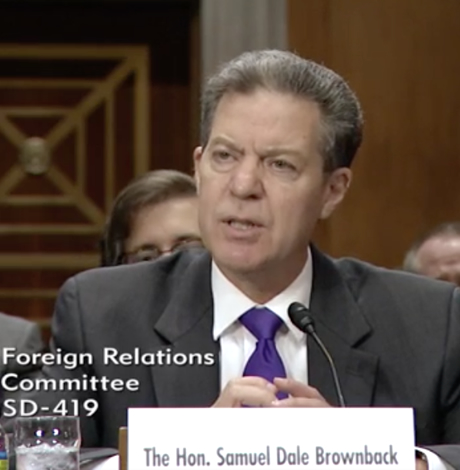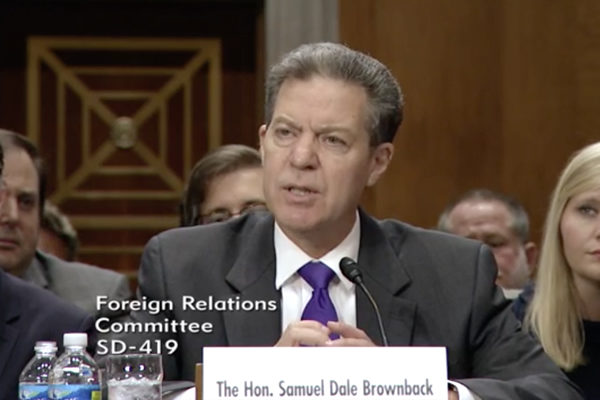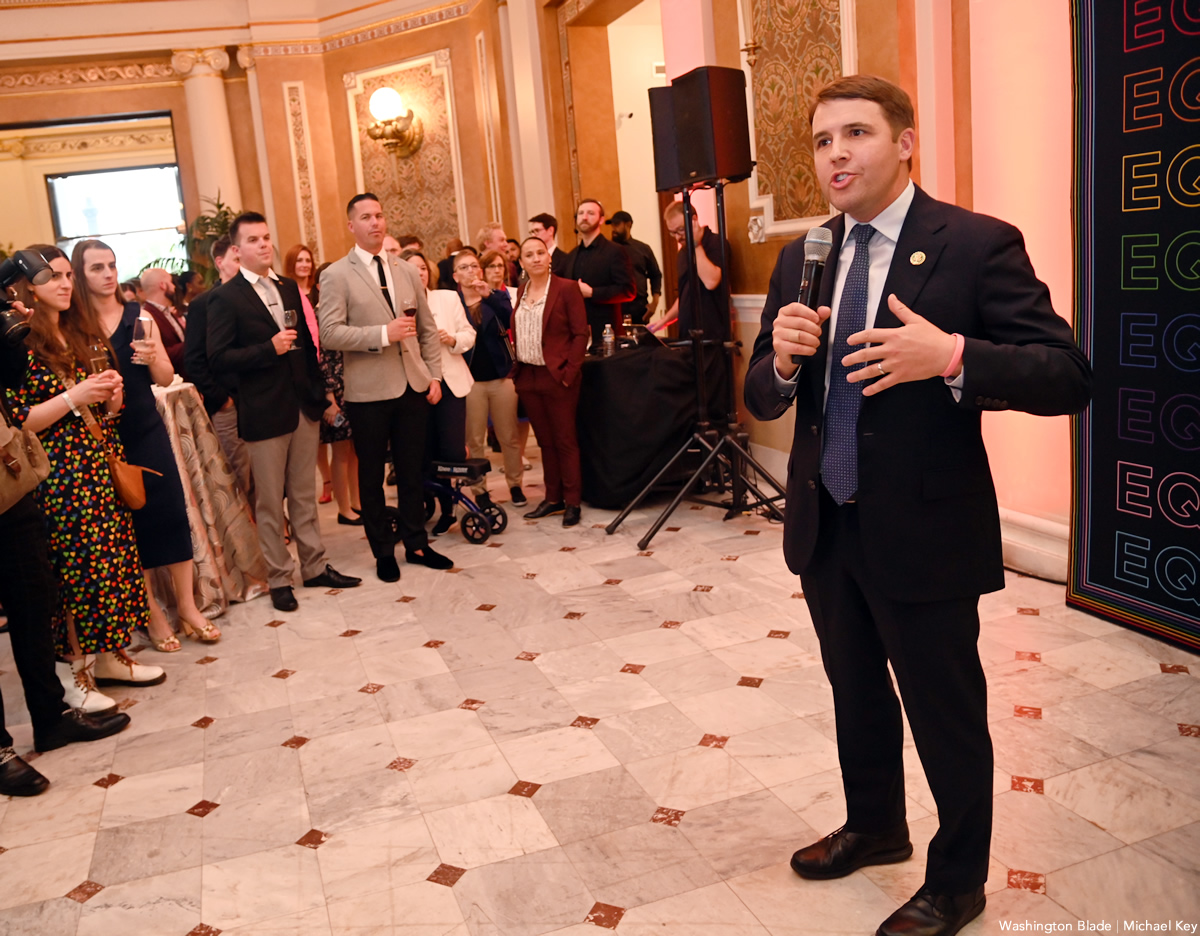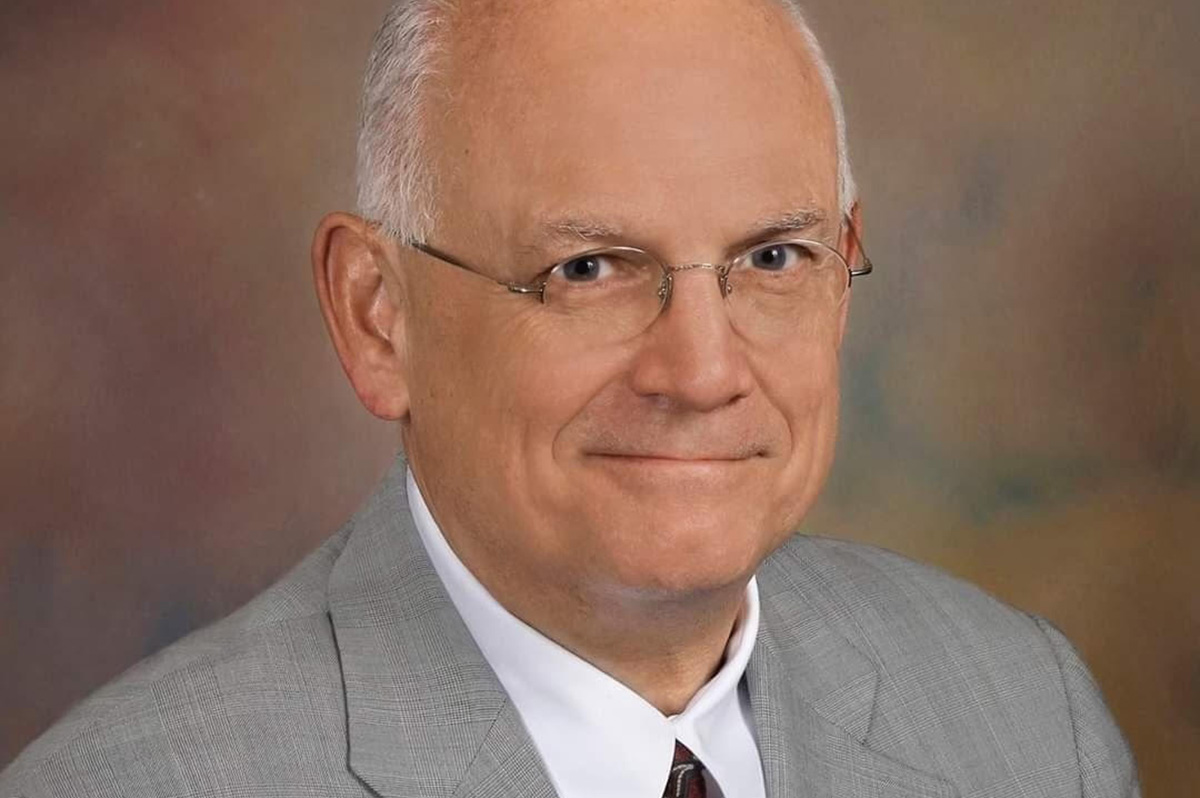News
Trump nominee refuses to say foreign laws criminalizing gays unjustified
Brownback nominated as U.S. ambassador for int’l religious freedom


Gov. Sam Brownback (R-Kansas), nominated as U.S. ambassador for religious freedom, speaks before the Senate Foreign Relations Committee on Oct. 4, 2017. (Screen capture public domain)
President Trump’s pick as U.S. ambassador for international religious freedom faced tough questioning Wednesday over his anti-LGBT record during which he refused to say laws in foreign countries criminalizing LGBT status were always unjustified.
Kansas Gov. Sam Brownback, whom Trump nominated in July to become U.S. ambassador at-large for international religious freedom, was non-committal on opposition to these foreign laws, which in some cases penalize homosexuality with death, under questioning from Sen. Tim Kaine (D-Va.).
Seeking to connect the issue of anti-LGBT discrimination to religious freedom, Kaine asked Brownback if he’s aware that countries have laws punishing homosexuality with imprisonment or death.
When Brownback replied, “I believe that’s correct,” Kaine pointed out the justification for these draconian anti-gay laws is religious reasons.
In response, Brownback said the day before his confirmation hearing, he had a “lengthy conversation” with Randy Berry, who continues to serve during the Trump administration as U.S. envoy for the State Department for international LGBT human rights issues, and how he worked with the Obama administration’s U.S. ambassador for religious freedom David Saperstein.
“We had a good conversation about how these two offices work together,” Brownback said. “I don’t see doing anything any different than what they worked together.”
Kaine started to reply, “That wasn’t really my question,” but Brownback responded, “But that really is the point.”
Seeking to get back on topic, Kaine asked the nominee if there’s any situation in which religious freedom could be used to justify laws imprisoning or executing people for being LGBT, but Brownback didn’t directly answer.
“I agree with what Randy Berry did around the world on that topic,” Brownback said. “I’m not fully briefed on the various specifics of what he basically did and described to me yesterday and the work he did back and forth with ambassador Saperstein, I wouldn’t see changing.”
With his question unanswered, Kaine asked again if there’s any circumstance in which criminalizing homosexuality for religious reasons is justified, but Brownback again declined to directly answer.
“I don’t know what that would be and what circumstance, but I would continue the policies that had been done in the prior administration in work on these international issues,” he said.
Kaine wasn’t satisfied: “I really would expect an unequivocal answer on that, but my time is up.”
Brownback refused to say outright laws criminalizing homosexuality are always unjustified days after the Trump administration faced criticism for voting against a U.N. resolution condemning the death penalty for homosexuality. The Trump administration defended that action by saying the resolution was about the death penalty in general, not specific to gays, and previous administrations declined to support similar resolutions.
The choice of Brownback as ambassador for religious freedom overseas has inspired consternation among LGBT rights supporters since Trump announced his choice based on the Kansas governor’s anti-LGBT record, which was explored during the hearing.
Brownback also faced tough questions from Kaine about rescinding as governor an executive order barring anti-LGBT discrimination in the state workforce.
Referencing Brownback’s decision in 2015 to reverse the order established by his Democratic predecessor Kathleen Sebelius, Kaine asked the nominee to defend his actions.
“That was an order that created a right by the executive branch that wasn’t available to other people and it wasn’t passed by the legislative branch,” Brownback replied. “I believe those sorts of issues should be passed a legislative branch.”
But Kaine wouldn’t have Brownback’s explanation the protections should be left the legislature, asking the nominee, “Isn’t that kind of the point to an executive order?”
“You issue an executive order on something that the legislature doesn’t pass,” Kaine added. “If it was clearly in statute, you wouldn’t need to issue an executive order.”
But Brownback said an executive order against anti-LGBT discrimination would be inappropriate because it was “a foundational issue that you were creating a right for state employees that wasn’t available to the rest of the people in the state.”
When Kaine replied “was it bad” to give state employees a course of action under anti-LGBT discrimination, Brownback insisted the state legislature should be responsible for those protections.
Kaine asked Brownback a series of questions on whether as Kansas governor he appoints Cabinet secretaries and agency heads, and the nominee more or less affirmed that was the case. When Kaine asked Brownback if he applies a high standard to state employees, Brownback replied “yes.”
Kaine’s follow up: Why then, as Kansas governor, could he also not protect LGBT state employees through executive order?
“If you’re hiring for honesty, if you’re hiring for competence, wouldn’t that be an appropriate thing that the governor as a chief of state personnel operation would want to know about leaders in state government,” Kaine said.
Brownback’s defense: “I think that would be a rational thing. I just don’t think it’s a right the executive branch should create without the legislative branch.”
Reversing the executive order isn’t the only anti-LGBT action Brownback took as governor. Last year, he signed into law a “religious freedom” bill allowing student groups at taxpayer-funded public universities in Kansas to deny membership to LGBT students.
As a member of Congress — first as U.S. House member, then as U.S. senator — Brownback built a significant anti-LGBT reputation. Among other things, Brownback championed a U.S. constitutional amendment that would have banned same-sex marriage.
Kaine recalled during his tenure as Virginia governor issuing an executive order against anti-gay discrimination in state employment, saying that was the first action he took as governor even though he faced resistance from then-Virginia Attorney General Bob McDonnell over the legislature not having acted on the issue.
“Can’t you see that the retraction of an executive order like this that had been in place for eight years sends a message that that is not a value, non-discrimination against folks on the grounds of sexual orientation, that’s not a value that you share?”
Brownback disagreed and insisted for the role at hand as ambassador for religious freedom, he wouldn’t engage in any kind of discrimination.
“I look forward to working with people, working with everybody regardless of their ideas or views on how we can advance the agenda of religious freedom,” Brownback said.
Also questioning Brownback on LGBT rights was Sen. Jeanne Shaheen (D-N.H.), who after raising the issue of Indonesian refugees in her state facing deportation asked Brownback if he’s willing to work with civil society groups working not just on religious freedom, but LGBT and women’s rights.
In response, Brownback insisted his focus will be religious freedom to maintain bipartisan support for that role.
“I will work with anybody that I can on the topic of religious freedom and not veer out of that lane because I think if you start to veer out of that lane, you get pulled to other topics that other people are charged with doing, you’re going to lose bipartisan support for the position, which is critical to have,” Brownback said.
Coming to Brownback’s defense was Sen. Marco Rubio (R-Fla.), who was chairing the hearing and said his colleagues were asking him about topics other than religious freedom.
“If there is persecution on the basis of religion, or oppression on the basis of religion, or the denial of liberty on the basis of religion, your job would be to advocate for that freedom for them to practice in peace religion in peace,” Rubio said. “That is the scope of the job that you’d been nominated to, is that correct, not to litigation theological points or policy differences beyond the scope of that liberty?”
Brownback affirmed that view and repeated his response that bipartisan support for his role is important, adding a distraction into other issues would make the position “less effective if effective at all.”
David Stacy, the Human Rights Campaign’s director of government affairs, said after the hearing his organization remains “deeply concerned” about Brownback’s nomination.
“Brownback’s long history of anti-LGBTQ actions in Congress and as governor was reflected in his refusal at his hearing today to unequivocally condemn the inhumane treatment, including execution, of people based on sexual orientation and gender identity,” Stacy said. “While he expressed some support for the LGBTQ human rights work at the State Department, his other responses give us every reason to believe that Brownback will continue to use his own narrow view of ‘religious freedom’ as permission to discriminate against LGBTQ people.”
District of Columbia
Gay Men’s Chorus of Washington to celebrate Spring Affair honorees
‘Their work inspires our music and deepens our mission’

For 44 years, the Gay Men’s Chorus of Washington (GMCW) has served as a powerful voice for love, unity, and pride among Washington’s LGBTQ community and its allies. Since its first performance in 1981—at the opening of the National Gay Task Force’s Washington office (later becoming the National LGBTQ Task Force)—GMCW has built a politically engaged and culturally significant legacy as one of the nation’s foremost LGBTQ performing arts organizations.
As its music and mission evolved, GMCW deepened its involvement in supporting LGBTQ individuals and allies alike. In 2004, the chorus launched its first Spring Affair fundraiser. This annual event not only generates financial support for the inclusive choral group, but also honors individuals and organizations in the Washington community who exemplify GMCW’s mission of unity, equity, and empowerment through music.
Each year at the Spring Affair gala, the chorus honors one community leader, one external organization, and one GMCW member. For the 2025 gala, GMCW will recognize Bishop Mariann Edgar Budde, Atlas Performing Arts Center, and GMCW member Keygan Miller.
“These honorees remind us why we sing,” said Thea Kano, artistic director of the Gay Men’s Chorus of Washington, DC, in an email. “In moments when our community has needed strength, they’ve offered hope. Whether it’s a brave voice from the pulpit, a tireless advocate for our youth, or an organization that opens its doors to every story—each has chosen to lead with love, truth, and courage. Their work inspires our music and deepens our mission.”
GMCW will honor Bishop Mariann Edgar Budde, the first woman elected to lead the Episcopal Diocese of Washington, as its 2025 individual award recipient. A longtime champion of equity and inclusion, Bishop Budde gained national prominence during the Inaugural Prayer Service at Washington National Cathedral, where she spoke directly to newly sworn-in President Donald Trump.
“Have mercy, Mr. President,” she implored, lifting the hopes of the most vulnerable Americans targeted by Trump’s policies—particularly LGBTQ and immigrant communities. Her bold words signaled to the nation that she remains a genuine and outspoken voice for justice, unity, and truth, inspiring compassion and faith within and beyond her religious community.
GMCW will present the Harmony Award for an Organization to the Atlas Performing Arts Center, located in the historic H Street, N.E. corridor. In 2024 alone, Atlas hosted more than 400 events and provided $1.6 million in free and discounted tickets, arts education, community programming, and space use. Through this work, Atlas has amplified “artistic voices that reflect the full diversity of our community.”
The center has long partnered with GMCW, offering space for open mic nights, cabarets, GenOUT Chorus events like the Youth Summit, and even memorial services such as that for Bobby T. Boaz. Atlas exemplifies GMCW’s mission of storytelling, equity, and civic connection through programs like the INTERSECTIONS Festival and City at Peace.
“We are absolutely thrilled and deeply honored that the Atlas Performing Arts Center has been named a recipient of the GMCW Harmony Award! This recognition is a powerful affirmation of our commitment to uplifting voices, fostering inclusive creative expression, and building a space where everyone feels seen, heard, and celebrated,” said Jarrod Bennett, Executive Director of the Atlas Performing Arts Center.
“At the Atlas, our mission is rooted in the belief that the arts are for everyone—and that through performance, dialogue, and community, we can help shape a more just, compassionate world. To be acknowledged by the Gay Men’s Chorus of Washington, DC—an organization that has long stood at the forefront of championing equality and advancing the well-being of the LGBTQ+ community—is a profound and humbling honor. We continue to be inspired by GMCW’s work and are proud to stand alongside them in this shared vision. Thank you, GMCW, for this beautiful recognition. We carry it forward with gratitude and renewed energy for the work ahead.”
Finally, GMCW will honor Keygan Miller, a chorus member since 2017, for their leadership, advocacy, and commitment to equity both onstage and off. Within GMCW, Miller served as Vice President of Diversity and Inclusion, led conversations to expand trans inclusion, authored the “Day One” pledge, and played a critical role in shaping inclusive programming.
Outside the chorus, Miller serves as Director of Public Training for The Trevor Project, a national nonprofit focused on crisis intervention and suicide prevention services for LGBTQ youth under 25. They previously worked as an Advocacy Manager at the Trevor Project, where they championed policies protecting LGBTQ+ youth at every level of government.
As GMCW continues its mission to uplift and unite through music, the organization encourages new voices to join its ranks. GMCW welcomes all singers—regardless of gender identity or sexual orientation—who can sing in the lower vocal registers.
The 2025 Spring Affair Gala will take place on May 17, 2025, at The Ritz-Carlton, Washington, D.C. This annual benefit supports GMCW’s artistic and educational programming. For tickets, audition information, and more, visit GMCW.org.
Congress
Goodlander endorses Pappas’s Senate bid
Announcement puts gay congressman on the path to securing his party’s nomination

U.S. Rep. Maggie Goodlander (D-N.H.) on Thursday announced she will not run to represent her state in the U.S. Senate, endorsing gay U.S. Rep. Chris Pappas’s (D-N.H.) bid for the seat of retiring U.S. Sen. Jeanne Shaheen, putting him on the path to secure the Democratic nomination.
“We are in the fight of our lifetimes right now, of a moment of real crisis and challenge,” she said. “I feel humbled and grateful to so many people across our state who have encouraged me to take a look at the U.S. Senate, and after a lot of thought and conversations with people I love and people I respect and people who I had never met before, who I work for in this role right now, I’ve decided that I’m running for re election in the House of Representatives.”
When asked by a reporter from the ABC affiliate station in New Hampshire whether she would endorse Pappas, Goodlander said, “Yes. Chris Pappas has been amazing partner to me in this work and for many years. And I really admire him. I have a lot of confidence in him.”
She continued, “He and I come to this work, I think with a similar set of values, we also have really similar family stories. Our families both came to New Hampshire over 100 years ago from the very same part of northern Greece. And the values that he brings to this work are ones that that I really, really admire. So I’m proud to support him, and I’m really excited to be working with him right now because we’ve got a lot of work to do.”
Today in Salem @MaggieG603 tells @WMUR9 she is not running for U.S. Senate & endorses @ChrisPappasNH #NHPolitics #NHSen #NH02 #WMUR pic.twitter.com/W2CMrhRuIC
— Adam Sexton (@AdamSextonWMUR) April 17, 2025
“Maggie Goodlander has dedicated her career to service, and we can always count on her to stand up to powerful interests and put people first,” Pappas said in a post on X. “I’m so grateful to call her my friend and teammate, and I’m proud to support her re-election and stand with her in the fights ahead.”
Earlier this month, former New Hampshire Gov. Chris Sununu, a Republican, announced he would not enter the Senate race, strengthening the odds that Democrats will retain control of Shaheen’s seat.
Obituary
Local attorney, LGBTQ rights advocate Dale Sanders dies at 75
Acclaimed lawyer credited with advancing legal rights for people with HIV/AIDS

Dale Edwin Sanders, an attorney who practiced law in D.C. and Northern Virginia for more than 40 years and is credited with playing a key role in providing legal services for people living with HIV/AIDS beginning in the early 1980s, died April 10 at the age of 75.
His brother, Wade Sanders, said the cause of death was a heart attack that occurred at Johns Hopkins Hospital in Baltimore shortly after he had back surgery.
Wade Sanders described his brother as a “trial lawyer, passionate criminal defense, and civil litigator for human rights” for close to 50 years, with some of his work focused on “civil law, notably gay-related insurance discrimination during the AIDS epidemic.”
He called his brother “a zealous advocate for the oppressed, his clients, and his personal convictions.”
Born in Arlington, Va., and raised in McLean, Va., Dale Sanders graduated from Langley High School in McLean and received his bachelor’s degree from the University of Virginia, his brother said. He received his law degree from D.C.’s American University Washington College of Law and began his law practice in 1976 in Old Town, Alexandria, Wade Sanders said.
Amy Nelson, director of Legal Services for D.C. ‘s Whitman-Walker Health, said Sanders became one of Whitman-Walker’s original volunteer pro-bono attorneys in the 1980s.
“Dale was a beloved part of the legal services program and our medical-legal partnership for nearly 40 years,” Nelson said. “Dale was one of the clinic’s first volunteer attorneys at Whitman-Walker’s weekly, legal walk-in clinic offering free counseling to clients about their legal rights in the face of HIV/AIDS and LGBT discrimination from employers, landlords, medical providers, and insurance companies,” according to Nelson.
Nelson added, “Dale represented dozens of people impacted by the ignorance and prejudice attendant to an HIV/AIDS diagnosis, and his litigation wins were instrumental in advancing the legal rights of persons living with HIV/AIDS.”
Sanders’s most recent case on behalf of Whitman-Walker took place in 2023 in support of a transgender woman in Virginia who faced discrimination from her employer and health insurer, Nelson said.
In 1989, Whitman-Walker presented Sanders with its Gene Frey Award for Volunteer Service, and in 1994 presented him with its Founders Award for Pro Bono Legal Services, Nelson told the Blade. She said in 2024, Whitman-Walker re-named its annual Going the Extra Mile Pro Bono Award as the Dale Sanders Award for Pro Bono Excellence.
“Dale’s legacy helped to shape HIV/AIDS law, and his fierce commitment to justice will live on at Whitman-Walker Health,” Nelson said in a statement. “We will miss him dearly.”
Daniel Bruner, who served as Whitman-Walker’s legal services director prior to Amy Nelson taking that position, said Sanders played a role in shaping his own legal skills and knowledge.
“Dale was one of my earliest legal models among local, and national, advocates for people living with HIV and LGBT people,” Bruner told the Blade. “He was a fierce, persistent advocate for his clients and for the community,” Bruner said, adding, “He won key victories in several cases where employees’ or health care patients’ privacy had been egregiously violated. I certainly will never forget him.”
Wade Sanders said his brother was also an avid bridge player, saying he played competitively. “He earned the rank of Ruby Life Master, a pretty big deal in the bridge world,” Wade Sanders said.
Dale Sanders is survived by his husband, Christian Samonte; his sister, Joyce Sanders of York, S.C.; his brother Wade Sanders of West Jefferson, N.C.; and his beloved dogs Langley and Abigail, his brother said in a statement.
A memorial service for Dale Sanders organized by the Sanders family and the LGBTQ Catholic group Dignity Washington will be held Saturday, May 10, at 1 p.m. at St. Margaret’s Episcopal Church at 1830 Connecticut Ave., N.W. in D.C., a Dignity Washington spokesperson said.
-

 District of Columbia5 days ago
District of Columbia5 days agoFinal push to raise funds, fill D.C. hotels as WorldPride nears
-

 El Salvador3 days ago
El Salvador3 days agoGay Venezuelan makeup artist remains in El Salvador mega prison
-

 District of Columbia4 days ago
District of Columbia4 days agoReenactment of 1965 gay rights protest at White House set for April 17
-

 Maryland4 days ago
Maryland4 days agoFreeState Justice: Transgender activist ‘hijacked’ Moore’s Transgender Day of Visibility event










